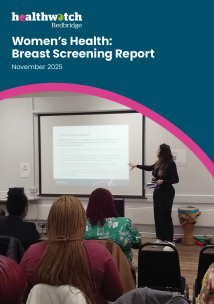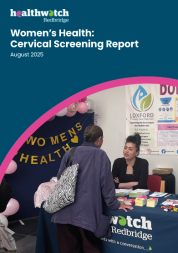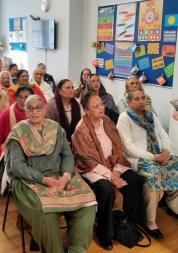Women's Health: Breast Screening Report

About the Women’s Health Project
The Healthwatch Redbridge (HWR) Women’s Health Project was established in 2024, to engage with and hear from all women about their experience and understanding of women’s health provision in Redbridge and use these insights to influence and affect change.
The research project has been designed in 3 phases over 2024 – 2025:
- Phase 1: Cervical Screening
- Phase 2: Breast Screening
- Phase 3: Perimenopause and Menopause
Our first report focused on cervical screening and was published in August 2025. This report responds to the issues women told us about accessing breast screening in Redbridge. We will publish our final report on menopause and perimenopause in Winter 2025.
Background
In the second phase of this project, we turned to breast screening. In Redbridge, breast screening uptake has consistently exceeded the London average.
While we recognise this strength, we must remain ambitions. Our goal is to not only meet the national average, but exceed it, ensuring that every woman in Redbridge receives timely, culturally competent and equitable care.
“...so, you don’t feel that it was really a process that was quite supported. There’s nobody there to help you.” - Carer participant
London Borough of Redbridge and partners opened a new mobile screening site in Ilford in January 2024, helping to encourage more women to take up screening by providing the service in a central and accessible location.
Based on our conversations with local women, we believe further uptake can be encouraged by improving accessibility, strengthening communication and embedding trauma-informed, culturally sensitive practices.
Understanding where screening invitations, appointments, and locations are failing to meet the needs of local women, we can build a collaborative system that supports women to make screenings a natural part of their busy lives.
“I have a visual impairment, so I’m unable to read any printed materials, obviously, had to ask somebody to read the letter to me, so I was only able to digest so much information... because I couldn’t go back and reread it." - Participant with a visual impairment
Report Findings
Patient experience: Wheelchair users (80%) and Black British Caribbean women (70%) found screening uncomfortable or painful. Learning-disabled participants (75%) described their screening as stressful, nervous, or uncomfortable. Bengali women (25%) reported rushed appointments or past misdiagnoses.
Translated information: Bengali and Indian women (66.7%) expressed a need for simplified, translated materials to support their understanding of breast screening. Bengali women preferred leaflets in their own language, citing reliance on family members for translation as a barrier. Indian women found translated invites too formal or technical, creating confusion.
Health literacy: Indian (60%) and Bengali (55.6%) women had never discussed breast screening with family or friends. Confidence in self-examination was low among (44.4%) of carers and Bengali women. Bengali participants (50%) stressed the need for breast screening education across all genders and ethnic groups, while (22.2%) cited cultural barriers, such as stigma, family control, and reliance on in-laws as obstacles to access.
Provision of information: Wheelchair users (60%) and learning-disabled women (43%) said they had not received screening invites or had their needs recorded. Disabled women (37.5%) and carers (33.3%) found invitation language unclear and complex, while (28.6%) of learning-disabled participants struggled with medical terminology like “fibrous tissue” and other unexplained clinical terms.
Accessibility issues: Black British Caribbean women faced transport and distance barriers, with 75% affected, while 60% of wheelchair users reported major accessibility issues like non-accessible mobile units or being asked to stand during screening.
Appointment flexibility and delays: Indian women (55.5%) reported challenges in scheduling, while 40% of wheelchair users cited difficulties due to unsuitable venues and transport. Bengali women (37.5%) raised concerns about location choice and the ability to reschedule. Delays in referral for mammograms after discovering a lump were reported by 20% of Black British Caribbean women, 11.1% of Bengali women, and 18.8% of Indian women.
Age eligibility: Lowering the minimum age was backed by Indian, disabled, and Black British Caribbean women, with 90% in favour, along with 83.3% of Bengali participants. Removing the upper age limit was also advocated by 66.7% of carers and 60% of disabled women, reflecting a strong preference for access based on individual risk rather than fixed age thresholds.
Support & emotional well-being: Bengali participants (22.2%), felt the environment was overly clinical and lacking warmth. Meanwhile, 20% of Black British Caribbean women described staff attitudes as dismissive, which impacted their sense of comfort and trust in the service.
Improve Data Recording: GP practices and screening services should keep better records of women’s support needs, such as preferred language, learning disability, or access requirements.
Download the report
If you would like this report in another format, please get in touch:
Email: info@healthwatchredbridge.co.uk
Phone: 020 8553 1236

